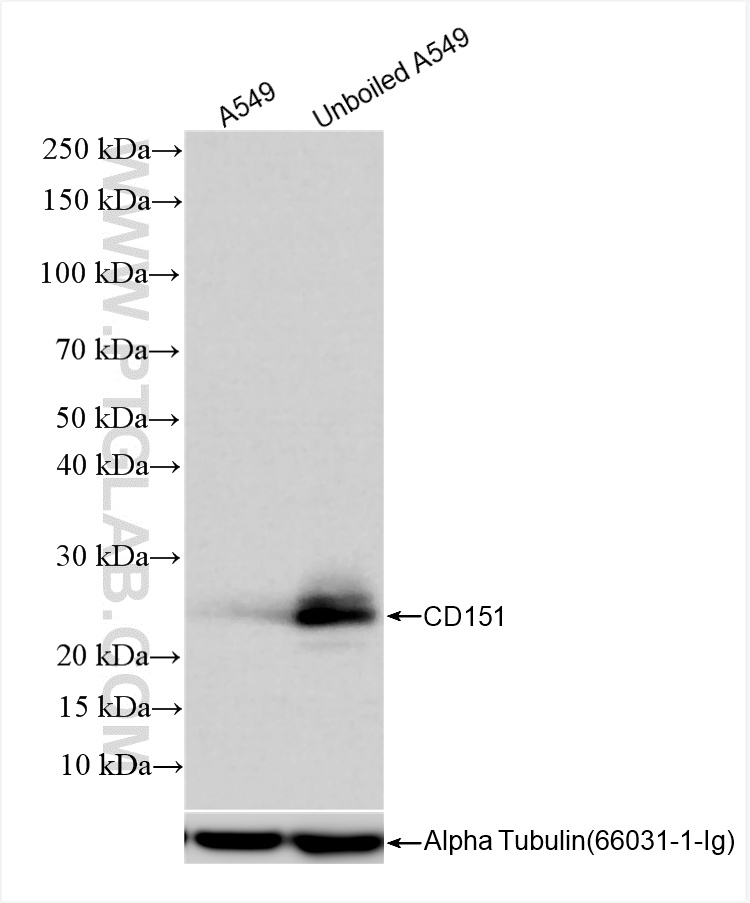验证数据展示
经过测试的应用
| Positive WB detected in | 37°C incubated A549 cells |
| Positive IHC detected in | human tonsillitis tissue Note: suggested antigen retrieval with TE buffer pH 9.0; (*) Alternatively, antigen retrieval may be performed with citrate buffer pH 6.0 |
推荐稀释比
| 应用 | 推荐稀释比 |
|---|---|
| Western Blot (WB) | WB : 1:2000-1:10000 |
| Immunohistochemistry (IHC) | IHC : 1:50-1:500 |
| It is recommended that this reagent should be titrated in each testing system to obtain optimal results. | |
| Sample-dependent, Check data in validation data gallery. | |
产品信息
85385-1-RR targets CD151 in WB, IHC, ELISA applications and shows reactivity with human samples.
| 经测试应用 | WB, IHC, ELISA Application Description |
| 经测试反应性 | human |
| 免疫原 |
CatNo: Eg3476 Product name: Recombinant Human CD151 protein (rFc Tag) Source: mammalian cells-derived, pHZ-KIsec-C-rFc Tag: C-rFc Domain: 113-221 aa of NM_004357.5 Sequence: AYYQQLNTELKENLKDTMTKRYHQPGHEAVTSAVDQLQQEFHCCGSNNSQDWRDSEWIRSQEAGGRVVPDSCCKTVVALCGQRDHASNIYKVEGGCITKLETFIQEHLR 种属同源性预测 |
| 宿主/亚型 | Rabbit / IgG |
| 抗体类别 | Recombinant |
| 产品类型 | Antibody |
| 全称 | CD151 molecule (Raph blood group) |
| 别名 | 242425G4, CD151 antigen, GP27, Membrane glycoprotein SFA 1, Membrane glycoprotein SFA-1 |
| 计算分子量 | 28kDa |
| 观测分子量 | 28 kDa |
| GenBank蛋白编号 | NM_004357.5 |
| 基因名称 | CD151 |
| Gene ID (NCBI) | 977 |
| 偶联类型 | Unconjugated |
| 形式 | Liquid |
| 纯化方式 | Protein A purification |
| UNIPROT ID | P48509 |
| 储存缓冲液 | PBS with 0.02% sodium azide and 50% glycerol, pH 7.3. |
| 储存条件 | Store at -20°C. Stable for one year after shipment. Aliquoting is unnecessary for -20oC storage. |
背景介绍
CD151 (also known as TSPAN24) is a membrane protein of the tetraspanin superfamily, which are characterized by the presence of four conserved transmembrane regions. Many of these members are involved in the regulation of cell development, activation, growth and motility. CD151 is broadly expressed by a variety of cell types. It is involved in cellular processes including cell adhesion and may regulate integrin trafficking and/or function. CD151 enhances cell motility, invasion and metastasis of cancer cells.
实验方案
| Product Specific Protocols | |
|---|---|
| IHC protocol for CD151 antibody 85385-1-RR | Download protocol |
| WB protocol for CD151 antibody 85385-1-RR | Download protocol |
| Standard Protocols | |
|---|---|
| Click here to view our Standard Protocols |




